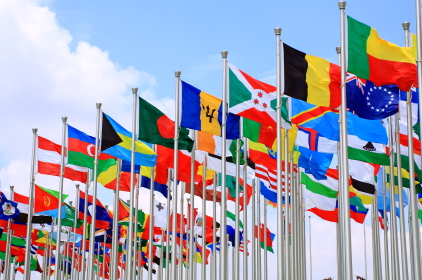How to Succeed in Multilingual Internet Marketing
Overseas consumers are coming online at an incredible rate. Now with 63% of the world’s online population as non-English speakers, multilingual SEM strategies are necessary for effective global internet marketing.
According to Internet World Stats, the Middle East and Africa have the fastest growing online populations, while Asia accounts for 44.8 percent of internet users. A survey by eMarketer also revealed the social media boom that’s happening in Asia, the Middle East and Africa, while South America is a key market for Twitter, Facebook and Google+.
 According to the image to the right (made by Reddit user UCanDoEat), Russian, Spanish and Portuguese are continuing to trend upward with no sign of slowing down.
According to the image to the right (made by Reddit user UCanDoEat), Russian, Spanish and Portuguese are continuing to trend upward with no sign of slowing down.
If you are targeting customers who speak these languages, it’s worth considering translating your content to better reach and connect with them. And while German, French, and Japanese are trending down, they still represent such a large portion of the online community that it’s worth thinking through your approach to those markets as well.
Don’t rely on English to reach these consumers. Even where the educated elite speak English as a second language, research shows that the majority of web users prefer to browse in their mother tongue. This figure was as high as 90% in Europe. Use international PPC advertising to reach these speakers of other languages and you can tap into these valuable markets.
International PPC Best Practices:
When setting up an international PPC campaign, it’s important to follow these key steps:
1. Research the initial keyword list
Once an initial keyword list has been drafted, proper research of each keyword and search phraseology must be completed for all of your target markets/audiences/languages. Google’s keyword tool is an important, if basic, tool to research the keyword volume both locally and globally. Following this research step, you will want to once again review the list against your stated strategic objectives and target segmentation data.
It is also very important to create a negative keyword list in order to avoid unwanted traffic or errant click-through traffic which might cost you money. For instance if your ads are about 5-star luxury hotels, you will need to include into your negative keyword list key terms like “cheap rooms, cheap hotels, etc.”. Google Adwords allows you to include the negative keywords into your campaign to avoid displaying your ad for similar, but unrelated (non-targeted) keyword searches.
2. Keyword localization
Keyword localization is very different from simply translating keywords. There are several steps you need to follow during the keywords localization process in order to create an accurate keyword list for each country/language. These key steps include:
- Researching the local search volume for your target country/region, keyword expansion choices and the most relevant keywords with the highest search volume.
- Adapting the keywords to the locale (combination of language, culture and geography).
- Testing keywords to make sure they are accurate and aligned to your campaign goals and the local search engines.
- Common phraseology for target searches.
- Negative keyword list development for each language/locale.
Accurate keyword localization will yield the best results for your PPC campaign because these are the keywords that will control your ad display and ad impressions.
3. PPC ad localization and copywriting
Many companies simply translate their English PPC messaging while ignoring copywriting or local search behavior. PPC ads are the advertising messages displayed for your audience. As such, professional copywriting is essential for ad localization in order to effectively deliver your message in the target language. In order to avoid your advertising message from becoming lost in translation, you need to have native speakers with solid experience in PPC character limitation as part of your team.
4. Choosing search engines
Although Google remains the global search leader, you will often find that local markets exhibit different search behaviors and patterns. It is important to research the search patterns of your target markets to determine which engines will best reach your intended audience. For instance, Baidu is the best choice for the Chinese market while Yandex is very popular in Russia.
5. PPC campaign settings
In what geographical locations do you want your ads to show? For multilingual PPC campaigns it is very important to specify the locations for each language. It is one of the basic steps for each campaign to adapt your settings carefully by selecting the accurate options when you start the campaign. Most popular tools also allow detailed budgetary control. Keep in mind that you will want to actively manage your campaign settings to optimize your visibility and quality click-stream.
6. Landing page optimization
Landing pages are the destination for your ads and it is the way to measure the conversation rates for your campaign. Landing pages should be created specifically for each marketing activity with a call to action or a form to capture visitor information. It is best to have a localized landing page for each language identified in your international PPC campaign. Experts agree that not maintaining a landing page in the target language will result in significantly lower conversion rates.
7. PPC strategy
International PPC-focused strategy depends on treating each market individually and effectively. The key to a successful strategy with a high ROI is setting your goals up front. All activity during the campaign must be carefully monitored and adjusted to align with the overall strategic objectives.
Testing is always required to adjust your campaign accordingly and generate best practices. You will continually need to test your keywords, messaging, reports and landing pages to achieve top campaign results.
Tags In
Paul Rakovich
Browse All PostsTell Us Your Goals
Recent Posts
- Google PMax: Get the Most Out of Your Ad Campaigns While Combating Fraud
- Lead Ads Don’t Have to Suck: How to Leverage Them Correctly
- Why More Expensive PPC Ads are Almost Always Worth It
- Unlock the Secrets of Organic CPA: The Ultimate Guide to Cost Per Acquisition
- Secrets We’ve Learned from Years Working with Paid Account Reps at Meta, TikTok, LinkedIn and Google



